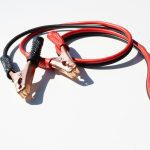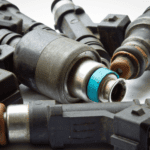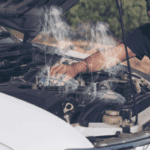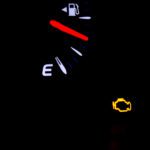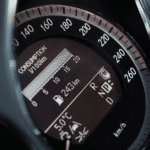Overfilling the engine oil is not good; no matter the vehicle, it can cause significant damage to the engine. But there is a bit of a debate over whether overfilling oil will cause damage to the turbo. This gets debated because if a turbo has failed and the engines overfilled with oil, it’s easy to blame the overfilled oil issue. No further investigation is carried out, so was it the oil or not? Regardless of what or who you believe, engine oil can cause a turbo failure in some way or another; in fact, it is the most common cause, which this article explains in detail.
Can Overfilling Engine Oil Damage the Turbo?
Suppose the engine oil level is significantly higher than recommended, such as by more than a liter. In that case, the turbo’s oil return pipe may struggle to cope with the excess oil, raising the working pressure inside the turbo, which will cause damage to the turbo. But if the engine is that overfilled, the turbo failing would be the least of your worries.
You can read more about the damage caused by overfilling the engine oil here.
A turbo uses a pressure hose with a restrictor to suck the correct amount of oil into the turbo and then return it to the oil sump. The bore of the oil pipes and the restrictor limit the amount of oil getting into the turbo bearings to reduce oil drag (limits the performance of the turbo). So, overfilling oil would only cause a problem if the internals of the turbo were already weak. In reality, running the engine low on oil would cause more damage to the turbo than overfilling it.
What Happens if a Turbo Gets Too Much Oil?
It’s generally not common for too much oil to damage a turbo. However, in some cases, an excess of oil can lead to turbo damage, but this is usually due to weak turbo internals rather than the oil level. When there is too much oil, the pressure inside the turbo increases, as does the pressure on the oil seals. This can cause the seals inside the turbo to leak; you may spot oil in the intercooler. However, as mentioned earlier, the seals would already be weak or have a small leak, allowing extra oil into parts of the turbo it shouldn’t be.
Another problem is if there is high oil pressure, which will also cause the oil seals in the turbo to burst. This means oil is forced into the exhaust system, leading to a buildup of back pressure and increased heat in the turbo. Although turbos are designed to handle high stress levels, they are limited in what they can withstand. This higher oil pressure can be caused by significantly overfilling the engine oil.
What Happens When the Turbo Oil Seals Fail?
When the oil seals in the turbo burst, it can cause severe damage to the engine and irreversible damage to the turbo. The oil that leaks out can get into the combustion chamber, causing the engine to burn oil and reducing its performance. Additionally, the oil can coat the tips of the spark plugs, causing misfires and rough idling. If the problem is not addressed promptly, it can lead to even more serious engine damage and costly repairs.
Otherways Engine Oil Can Damage the Turbocharger
It is not just the engine oil level but any minor defects that you can’t always be aware of with the oil can affect the turbo in several ways:
- Contaminated oil – Dirty or contaminated oil will be drawn into the turbo, increasing the chances of damage to the seals, blocking the oil lines, or damaging the bearings.
- Low oil – If the turbo does not get enough oil, the turbo will overheat. This causes unnecessary pressure on the turbo and causes the bearings to dry out and fail. A turbo failing due to low oil is much more likely to happen than too much oil.
- Old oil – Old engine oil has a thicker consistency, which will block the oil pipes and not cool or lubricate the turbo as it’s supposed to.
- Incorrect oil viscosity – Using the wrong oil viscosity will mean the oil is not cooling or lubricating the turbo properly, leading to increased friction and wear on the turbo’s components.
Engine oil plays two critical roles in the engine: lubricating the bearings and cooling the turbo. The engine oil flows through thin oil supply lines to and from the turbo, passing through an oil cooler. It is crucial to adhere to the recommended service schedules and change the engine oil regularly to ensure it cannot be responsible for turbo failure.
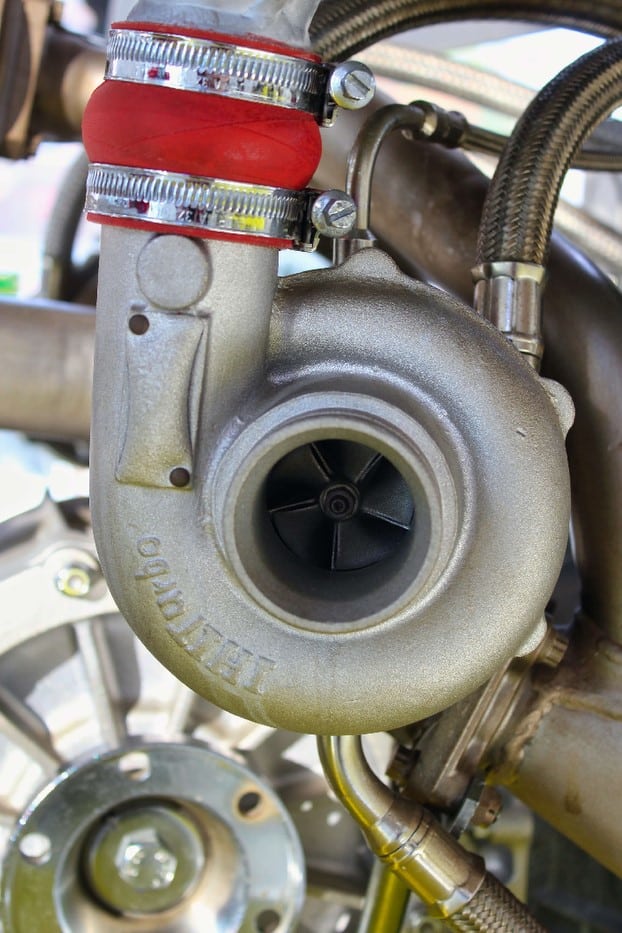
Other Reasons Why a Turbocharger Can Fail
An oil problem is the most common cause of a failed turbo; however, there are several other reasons for a turbocharger to fail. Other reasons include:
- Normal wear and tear.
- Excessive heat which can cause the turbine housing to crack or warp.
- Foreign object damage, such as debris from a broken air filter or the compressor wheel.
- Over-speeding the turbocharger beyond its recommended limits.
What Are Signs a Turbocharger Has Failed or Is Failing?
Some of the commonly found problems I find when inspecting a car with a failed turbocharger are:
- Loss of performance – The turbo’s job is to force additional air into the engine, boosting acceleration when hit around 3000RPM. When the turbo has failed or is failing, it won’t provide that increase in acceleration; you can expect poor throttle response and stuttering.
- Excess smoke from the exhaust – When a turbo fails, you can usually see the car produce excessive blue/grey exhaust gasses, especially when the engine is +3000RPM. This indicates that an oil seal in the turbo has probably failed.
- Noisy turbo under acceleration – In the center of the turbo is a propeller and bearing, which sucks air in; it can spin at 80,000rpm. If the bearing or the blade becomes faulty or damaged, you will hear an unusual, loud noise when trying to accelerate.
- Check Engine Light on – A turbo has multiple sensors that provide the ECU with information; the information will become skewed with a failed turbocharger. The ECU can sense a problem and will throw the light on.
Frequently Asked Questions
Does Engine Oil Affect The Turbo?
Engine oil is crucial to the functionality of a turbocharger as it is the most common cause of failure. Without oil, a turbocharger will fail quickly.
Why Is My Turbo Using So Much Oil?
If your turbo uses excessive oil, it may indicate a leak. To confirm this, you can inspect the turbo and look for signs of oil leakage. If the seals inside the turbo are blown, the oil may leak into the turbos intake side. There the oil will be burned during combustion, the engine will produce excessive smoke from its exhaust, and oil will get consumed quickly.
Bottom Line
Keeping the engine oil at the correct level will eliminate the potential for oil to damage the turbo. A turbo is one of the last items in an engine bay you should worry about if you drive overfilled with oil. Excess oil fill rarely damages a turbo; underfilled oil is much more common. If you suspect your turbo has or is failing, it would be better to take it to a mechanic for inspection.



